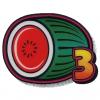The background game could simply be a choice from a pick table. The RNG could pick a number from 0 to 4999 and if it picks 4999 you get £25 per line bet. Pick between 0 and say 1200 and you get f*** all. And so on. Monkey Business is the same. You never see a win over £40 or £50 on the reels unless it's the Jackpot. All the big wins are paid from the Free Game feature. The reels are simply A FORM OF DISPLAY.
Party Games Slotto (or if you're Nails, SLUTTO) is different in that 15 numbers are chosen, one for each reel position. On reel 1 for each of the three positions a number is chosen, say between 0 and 20. A '0' is a seven, '14-20' gives a cherry, and so on. The list is different for each reel (there are no WILDS on reel 2 for a start. Of course on the last 2 reels you see more sevens, so maybe picking 0, 1, 2, 3 or 4 gives a seven, and only 19 and 20 index to a cherry. If you get a feature, more numbers are used. This is a lot different to picking one number and showing it in a number of ways. On Slotto, the reels themselves are generated at random, then the game looks to see what you have won, whereas on the other games (Elvis, MB etc) the result is already known and the game simply displays the result on the reels how it likes.
The jackpot on Slotto is a seperate decision made before the reels are decided. It does a 0-x decision and if it picks 0 it forces a jackpot in on the reels (full window of sevens). If any other number comes out it does a normal game and picks 15 numbers.
Controlled random? Yes you can control the randomness of a S16 game, but only in terms of volatility. If loads of percentage is used up by paying small wins, with a very slim chance of a jackpot, you get a game that has a great hit rate but is flat as f*** and you just slowly lose on, unless you get a jackpot. Do a game with a poor hit but with loads of decent high values when you do get a win, and a good jackpot chance, and you have a game that is very lumpy and could just as easily lose £1500 in a week as well as take it.
As long as the RNG decision is the same every game you have a fair game. If every win or has the same chance from one game to the next you have a machine on which you cannot predict the outcome from game to game.
The wheel on Elvis is not random. It is a form of display for the win that the RNG chose randomly beforehand. The game then shows the result.
How can a random game have a percentage?
The percentage is worked out by taking all the possible reel combinations, adding together the total money won from them and dividing by the amount of money it would cost to play each of these winning and losing games once only.
Just the same as if you cover all numbers on roulette (single zero) with £10 you will lay out £370, but you will get £360, or 97.3% of your money back. The game's edge is 1/37, or 2.7%.
Where random comes in is that each of the 37 different outcomes (to use roulette again as an example) has the same chance of coming out as any other on every game, and the result is not influence by events before or after - it is still 1/37.
So if someone was to say (for example) that a S16 will go dead and take money until it is 'ready' again, that would be just plain daft, as the game isn't supposed to know what it has paid out from one game to the next. It will have a running percentage, but this doesn't influence the way the game plays - the law of averages and the fact that the machine is on less than 100% takes care of that.
Christ, is that the time...I'm off to bed!
















